We continue with our Business Focus column and today we are discussing the TikTok and Miki Matsubara case. Do you already know what we are talking about?
We’ve said many times before how social media is a powerhouse for businesses and individuals alike, and in this year’s pandemic we’ve had confirmation of that. Even those who did not believe in the digital revolution have now had to change their minds.
How TikTok resurrected a Japanese pop star hit song
Author: Erika
In these months of quarantine and forced isolation, we have seen an increase in creativity on social media. A clear example of this is the rapid rise of TikTok, the favourite social media of young people, which has seen the number of users constantly growing to become the second most downloaded app in 2020.
From pranks to animals to the now famous dance videos, many TikTokers have launched trends that still accompany our days. But today the power of TikTok doesn’t just stop with its trends. The case of Miki Matsubara and how a video shared on this social managed to revive one of his hits from 1979 has caused a stir.
In December, users of the platform resurrected the song ‘Mayonaka no Door: Stay With Me’, which made Matsubara a star in Japan back in 1979. More than 40 years later, the song is still catchy and joyful enough to become the perfect soundtrack to TikTok videos featuring Japanese mothers;
“I did the TikTok when my mum was doing things around the house,” one user tells The Japan Times via email. This clip reached more than 1.5 million likes and views in a very short time, propelling “Mayonaka no Door” to the top of Spotify’s Global Viral 50 chart for three weeks.
@kickronnie
I’m asking her to sing this next karaoke night 👸🏻 #japan #japanese #おかあさま #fyp
♬ 真夜中のドア/Stay With Me – Miki Matsubara
Unfortunately, Matsubara died in 2004 and was unable to enjoy the revival. However, the song’s composer, 71-year-old Tetsuji Hayashi, tells the Japan Times that this new hit “seems very strange… it was so long ago”.
Music and social media
.
But is it really that strange? Let’s start with the fact that when a song is good, it’s still good even after forty years, but let’s also think about how much power social media has gained these days. Unfortunately, much of the Japanese music industry still seems to operate as if it were 1979, thus giving little importance to the digital and social media world. The Matsubara case is a case in point.

Singer-songwriter Tetsuji Hayashi says new technologies are rewriting the rules of how a song becomes a hit, “it could be from another country or another generation”. It’s been a few months now, but the ‘Mayonaka no Door’ case shows how the interaction between Japanese artists and international listeners has changed over the last few decades. International social media also allows a new generation to fall in love with an artist who might previously have been discarded from playlists simply because of her or his nationality. With the rise of K-pop and the unstoppable BTS, social media sites such as TikTok are also increasingly trending Japanese songs.
The power of TikTok
.

Based on recent statistics, TikTok users spend more than 850 minutes per month on the app, more than 14 hours per month. If we look at the data from October 2019 to March 2020, we can see a significant increase in the amount of time the average user spends on the app, also due to the lockdown.
This social media has spread like wildfire globally, particularly in Asian nations, becoming an entertainment outlet thanks in part to its search based on hashtags. In fact, as of June 2020, the most popular categories on TikTok all have over a billion views. If we go on to count lip-synching and dance videos, we arrive at a total of over 150 billion views.
2020 was marked by lockdowns, and it was during this time that people jumped on new media in search of entertainment and an outlet for their creativity. In fact, TikTok took second place on the list of most downloaded iPhone apps, surpassed only by Zoom for obvious reasons. TikTok even surpassed the downloads of Facebook, Messenger, Gmail, Netflix, YouTube and Instagram, across all app stores, making it the most popular app globally in 2020.
Moreover, in a world like the digital marketing one, we know how important the engagement rate of a social media is. Recent data show that engagement rate varies at different follower levels for Instagram, YouTube and other social media. However, at all follower levels, TikTok has a considerably higher rate than other platforms. In fact, Upfluence analysed that micro-influencers have an engagement rate of 17.96% on TikTok, compared to 3.86% on Instagram and 1.63% on YouTube. While mega-influencers have an engagement rate of 4.96% on TikTok, 1.21% on Instagram and 0.37% on YouTube.
The figures speak for themselves and in 2021 we can only expect a steady rise of this social network and who knows, maybe we can rediscover some other Japanese hits! Do you already have any idea on what the next music trend for TikTokers might be in 2021?
Share this:
- Click to share on Facebook (Opens in new window)
- Click to share on Twitter (Opens in new window)
- Click to share on Tumblr (Opens in new window)
- Click to share on Pinterest (Opens in new window)
- Click to share on Telegram (Opens in new window)
- Click to share on WhatsApp (Opens in new window)
- Click to share on Reddit (Opens in new window)
- Click to print (Opens in new window)






